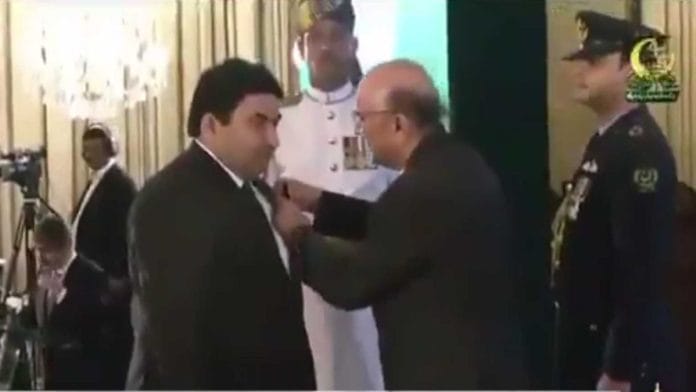New Delhi: The Pakistan government decided to give a service medal to a TV analyst on the country’s Independence Day. But according to his own admission, he was the “narrative-maker” on Pakistani TV during the height of the military conflict with India in May.
Qamar Cheema, a security commentator and head of the Islamabad-based Sanober Institute, was awarded the Tamgha-e-Imtiaz (Medal of Excellence) for what officials described as his pivotal media role during the India-Pakistan military standoff.
“There were days I didn’t sleep,” he recalled. “Samaa News for two hours, ARY for another two, then Geo, then Dunya. And then beepers all night.”
He was, by his own account, the face of Pakistan’s media strategy: articulating responses, defending the military’s actions against India, and shaping the public perception of the conflict.
“I was the main narrative-maker in Pakistan during the war,” Cheema told ThePrint over phone. “I was on TV ten hours a day. Everyone saw me.”
Tamgha-e-Imtiaz is awarded to civilians and military officials for contributions in various fields.
‘Marka-i-Haq’
The entire military and political brass in Pakistan involved during the conflict with India was awarded with the highest gallantry awards. The neighbouring country also rebranded its Independence Day celebrations, calling it Marka-i-Haq, or the Battle of Truth.
In an unprecedented move, Field Marshal Asim Munir awarded himself the Hilal-i-Jurat, Pakistan’s second-highest wartime gallantry medal. The government then extended honours across the establishment and beyond.
Apart from Cheema, journalist Wajahat Kazmi, in May, was awarded a medal for his journalism by the Sindh government. The irony is not lost on some Pakistanis.
When Kazmi had shared his achievement on X, some Pakistanis were quick to call out his journalism.
One person called the recognition Pakistan’s “downward spiral”.
Another said, “Isse achi war to hamne lari (we fought a better war than him)”.
Cheema, on his part, is ignorant to the politics of his award and instead places extreme importance on the people who gave him the medal. “To be recogniSed alongside the Army Chief and the Deputy Prime Minister, that’s a once-in-a-lifetime honor.”
The Tamgha-e-Imtiaz was also awarded to several individuals from Prime Minister Shehbaz Sharif’s inner circle as well as prominent media figures, according to a Dawn report.
The report said that the recipients included international affairs expert Ahmed Hassan Arabi, defence and security analyst Qamar Cheema, Principal Information Officer Mubashir Hassan, the Prime Minister’s PSO Muhammad Anas Iqbal, Joint Secretaries Salman Sharif and Maliha Shahid, and Speech Writer Arshad Mahmood Malik.
Journalists who received the award were Waseem Badami and Aneeqa Nisar of ARY News, Hamid Mir and Saleem Safi of Geo News, Mansoor Ali Khan of Hum News, Javed Chaudhry and Amir Ilyas Rana of Express TV, Mujeebur Rehman Shami of Dunya News, and Talat Hussain of Samaa TV. Others honoured included Muneeb Farooq, Naseem Zehra, Badar Shehbaz, and Nadeem Malik.
Veteran journalist Ansar Abbasi was also slated to receive the award, but reportedly declined the honour.
A total of 488 military awards were given out “in recognition of their contributions during Operation Bunyanum Marsoos in May of this year,” according to Pakistani media.
From lecture halls to live broadcasts
Cheema, also a regular on Indian TV channels before Operation Sindoor, holds a Master’s in nuclear non-proliferation and a PhD in political Islam from Quaid-e-Azam University. He began his career as a university professor in Islamabad. From 2010 to 2023, he taught international relations at institutions, including the National University of Modern Languages, NUST, and the National Defence University.
“I loved teaching,” he said. “But after 13 years, it felt monotonous. I needed something else.”
That “something else” was media. Cheema began appearing on television in 2017 and eventually co-founded the Sanober Institute, a private think tank, with Pakistan’s former foreign secretary Aizaz Ahmad Chaudhry. As the executive director of the institute, Cheema said he helped write strategic manifestos, hosted policy conferences, and advised on diplomacy and security.
Cheema claims to have worked on nuclear issues in the Indian subcontinent. On the award by the Pakistan government, he said, “It was not a journalism award. I’m not a journalist. I’m a scholar.”
The May conflict cemented Cheema’s public profile. With news cycles running round the clock, Cheema said he became the go-to analyst for Pakistani television.
“I was live on Geo News when Pakistan retaliated. That was a national moment. And I was part of it.”
One tweet of his — claiming that 70 per cent of India’s energy infrastructure had collapsed during the conflict — was flagged by India’s Ministry of External Affairs as fake news.
“That tweet went viral,” he said. “My follower count may be modest, but my content reached millions. That’s why it was flagged.”
Despite the scrutiny, Cheema said he holds no ill will toward Indian media or its audiences. “Everyone’s working for their own,” he said. “I’ll appear on any platform that gives me space to speak.”
(Edited by Aamaan Alam Khan)






